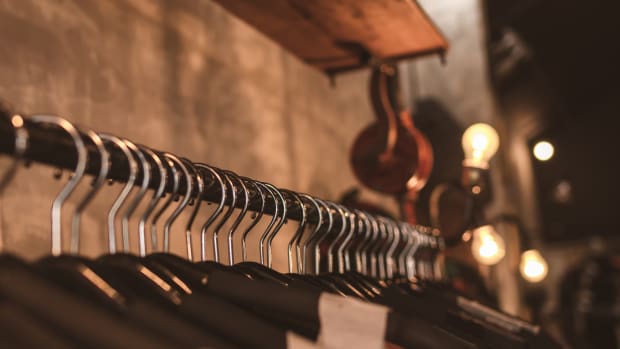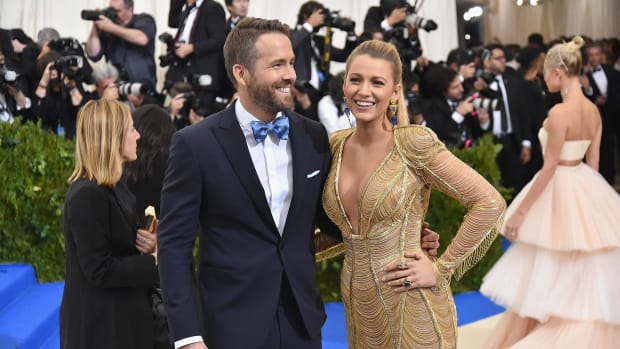Ask any millennial (or member of any prior generation): The last decade in plus-size fashion easily outpaced the previous 20 to 30 years. For a while there, we were moving in
a positive direction — but then, something happened.
Maybe it's the return of the early 2000s aesthetic (thank you, Miu Miu), or perhaps it's the re-emergence of the Tumblr girl. For whatever reason, conversation — and action — around body inclusivity has fizzled out.
Nowhere is that more apparent than the runway: According to Fashion Spot's annual runway diversity report, in spring 2020, 86 curve models walked across all four fashion capitals, but as shows got smaller and brands opted out of fashion week during the pandemic, those numbers plummeted. There are some signs of change on this front, but these stats are a reminder that fashion will always thrive on some level of exclusivity. We hate to admit it out loud, but you have to be rich/white/thin enough to really succeed on some level. The hope (or naïveté) was that as the industry saw the success of brands like Selkie and Good American, they would decide that the potential profits — reports predict that the plus-size fashion industry will be worth $696.7B by 2027 — outweighed the fatphobia. What happened, instead, was that fashion came to a certain point and just… gave up.
Sure, we have had some representation, from a handful of models like Paloma Elsesser and Precious Lee walking for major European luxury houses and Lizzo ringing up Donatella Versace for custom gowns. But for the most part, fashion remains closed to most fat people. Prevailing theories point to Covid-19 and a lack of interest from fat consumers as the culprits. To the former, we say: Duh, the entire fashion industry took a hit during Covid-19. For the latter, it's a "chicken and the egg" situation — retailers don't sell plus-size clothes (or they don't market clothes above a certain size), plus-size customers don't show interest (or simply don't know to look there), retailers use that as proof that it's not working. It's a repeating pattern, Charlie Brown.
This is where Tiktok comes in.
Social media has always been transformative. In less than a decade, it has effectively democratized the fashion industry. Now, indie designers who didn't have the funds or connections to court traditional gatekeepers can appeal directly to their target audience (if you can go viral, that is). That includes dynamic young women designing for fat bodies.
Sabrina Edelen's Wasil Clothing is, ironically, the kind of bright, playful, avant-garde, whimsical look that would have gotten thousands of re-blogs back in the day. The difference? Wasil is a size-inclusive brand, offering sizes XS-5X as well as customization for larger bodies at no additional cost.
The young designer identifies as mid-size, and says it was a no-brainer to make clothing in larger sizes: "That's always been my priority and the core [of my business]. It's always going to cater to plus-size clothing primarily."
Edelen is transparent about her journey as an indie designer, a tactic that plays well on Tiktok. (Her videos in the studio rake inthousandsof views.) In a November 2021 post shot in the popular "day in the life" format, she shares the process for creating a cloud-print puffer coat, noting that she doesn't yet have a drafting table or a specialty brush to clean her serger (a type of sewing machine) — but that doesn't stop her form creating a stunning "Delia's but make it couture" garment, which is sadly sold out online.
Women designing for fat bodies isn't a new phenomenon. As the digital body positive movement grew legs, we needed the right pants to go over them. Fat bodies finally wanted to be seen, and brands like Zelie for SheJibri and (the now-defunct) Rue107 made clothes we wanted to be seen in. Women — and particularly women of color — saw the value in dressing fat bodies before most major brands did.
These garments and the fat bodies that wore them were a major source of inspiration for designers like Doyeon Yoni Yu of C'Est D, an indie brand that currently offers XXS-6XL.
"I was born and raised in South Korea, which has very, very strict beauty and body standards," she says. "If you're not a size zero, you're fat. I hadn't been able to find any plus size creators…there was no representation of body diversity. I really didn't have any type of influencer or creator whom I could relate to."
Recommended Articles
Yu arrived in the U.S. to attend fashion school at the height of the #BOPO movement. In an effort to market her brand, she became something of an influencer herself, racking up over 62k followers on Tiktok by sharing both her brand and her personal experiences with weight discrimination in fashion and her culture. One such video sees Yu green-screen herself into a beach in Korea while wearing a bathing suit. "My parents are like 'cover your belly' URM NO ?," the caption reads. It has over 400K views and 100k likes.
Yu has also been open about her experience designing for fat bodies at Parsons, where she graduated from in 2018. Body inclusivity in fashion education has become a more pressing topic in recent years, with students begging these schoolsto do more. (To Parsons' credit, they made accommodations for Yu, and have since updated their curriculum with courses on body diversity at both the BFA and MFA level.) Yu originally launched C'Est D in the fairly standard XS-3X size range, but promised buyers subsequent collections would extend to sizes 4X, 5X and 6X. And she did: Every piece featured in Yu's debut show late last year was available in XXS to 6XL — even a pair of tie-dyed, bedazzled gloves, underscoring the need for not only clothing that fits fat bodies, but accessories as well.
If small brands like C'Est D and Wasil Clothing can offer larger bodies more options while operating with fewer resources, it begs the question that fat influencers and advocates like Sauyce West have been asking for years: Why can't larger brands do it? Why does inclusive fashion stop at 3X?
There's proof-positive that if you make clothes for fat people, we'll buy them. Since launching 4X through 6X, they've become C'est D's most popular sizes, Yu says: "I know that there are so many customers who need that inclusivity."
Fast-fashion brands like Shein, PrettyLittleThing and Boohoo — all of which have recently, albeit quietly, extended their size ranges — are also raking in the dough. These brands, however, don't offer many sustainable options, and have been held to the fire over their labor practices. If you're fat but want to shop more sustainably, the pickings are slim.
Taylor McCaw, a criminologist turned fashion designer, made sustainability a key focus for Hone the Label, her small, ethically-sourced, size-inclusive brand. The idea came from a frustrating search for clothing in her size: "[I said], 'Let's see if we can provide sustainable fashion that also looks at celebrating our bodies the way they are.'"
McCaw is quick to note that her desire to create sustainable clothing isn't an admonishment of fat fast-fashion shoppers, an opinion she often shares on the brand's Tiktok page, which was launched before the brand's first collection.
"Fast fashion has become a really big topic…and I feel like it's been weaponized against our plus size community," she says, noting how thrifting is rarely an option if you're above a certain size, and pricing is a big barrier for a lot of people, regardless of your dress size.
This is why affordability was the other focus for her brand. Sustainable fashion is so often more expensive than fast fashion, doubly so for those of us living in fat bodies. McCaw was determined to find the point where sustainable, inclusive and (relatively) affordable meet.
"With our price point, we're between $79 and $179AUD ($56-$128USD)," she says, "so in terms of where we would sit in the Australian market, it would be [a] mid-price point." The icing on the cake? The sizes on offer are AU14-28 (US10-24), and McCaw is looking to expand more in the future.
Affordability and extended sizing are two things that a larger brand with an established supply chain could easily handle. They could even find ways to be more sustainable , but the realization we've come to is: They don't want to.
Armed with a sewing machine, Tiktok's latest trending sound and a dream, the next generation of designers is here. And they're not interested in the self-imposed limits of the fashion industry.
Want the latest fashion industry news first? Sign up for our daily newsletter.



